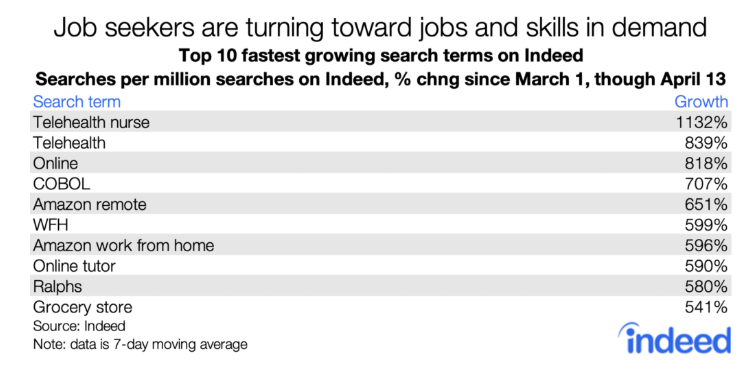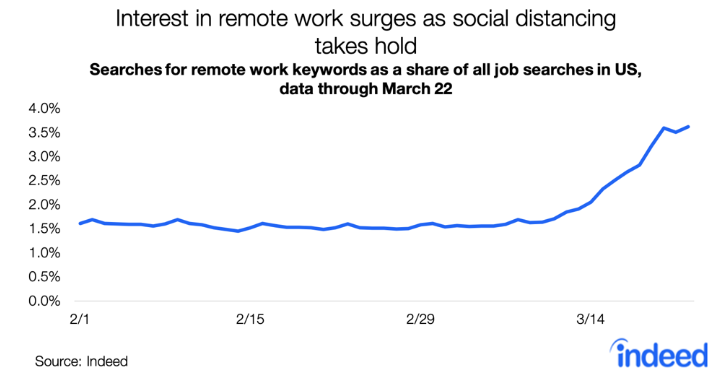With the sudden change to our world in March 2020, it affected several aspects of our daily lives. One of those aspects deals with how candidates are engaging with job openings.
What is changing? Let’s look at actual data from Indeed.

For example, the WFH, an abbreviation for “working from home” had a nearly 600% growth in searches in the past six weeks. Several other jobs that had online capabilities or were companies with large number of job openings dominated the search behavior.
On top of that, this data comes from the end of March:

Right after our behaviors really changed around March 13 in the United States, candidate behavior showed how our search behavior adjusted. Searches in the first half of March for “remote,” “work form home” and other related phrases more than doubled on Indeed.
What can your company do to take advantage of this huge influx of traffic looking for remote work options? Here is a game plan for your staffing agency
Put the Information Right in the job Title
I know, this goes against a lot of previous recommendations about job descriptions, but right now, these terms are exactly what job seekers want. We must create and tailor our content to what our audience wants. List a title of “Call Center WFH” or “Remote Call Center Agent” and monitor how it affect performance.
Think about the job seeker. If they go to a job board and search “Call Center Remote,” which job will they see first? The search results will show a “Remote Call Center Agent” before a generic “Call Center” job.
To really put it to the test, conduct A/B job testing. Post similar jobs with different titles and compare the results.
But right now, if you have remote options available for your jobs, don’t hesitate to include that information right in the job title.
Put the Information Right in the Job Description
Include information in the beginning of your job posting about the remote options. In those first few sentences, highlight those capabilities and benefits of the job.
Why is this important? It’s because job boards will scan your job descriptions to classify them and learn more about them.
This information comes straight from Indeed on what to include in your job description:
For jobs that are “temporarily remote due to COVID-19,” include one of these phrases:
- Work remotely temporarily due to COVID-19
- Work from home during coronavirus
- Can start remotely due to COVID-19
For jobs that have “work from home flexibility,” include one of these phrases:
- Flexible work from home options available
- Work from home days possible
- Options for working from home
For jobs that are “fully remote,” include one of these phrases:
- This is a remote position
- Employees will be working remotely
- Remote work allowed
Put the Information in the XML Feed of the Jobs
This last suggestion gets into the technical aspect, but in the feed of jobs that you are sending to Indeed and/or other job boards, specific the remote type:
- No
- COVID-19
- WFH Flexible
- Fully Remote
By putting this information in the <remotetype> field, it explicitly signals to the job boards how to classify your job.
If you are unsure about that last point, reach out to the company that manages your website or job board software and they will be happy to help! At Haley Marketing, out Client Success Team put together this AWESOME guide for our clients who use our job board software.
Monitor the Changes in Job Candidates Search
Job boards are reacting to the sudden changes in the job market just like everyone else. The more information your jobs can provide, the better your results will be. Job boards and job aggregators want to serve the best information to their audience.
By putting the information in the job title, job description and/or the XML feed, it proactively signals to the job boards and to your candidates about the job. It’s important to provide the information the audience wants, not the information we think they want.
Haley Marketing is here to help. Please check out our COVID-19 Resource Center for business strategy and marketing ideas that help staffing agencies survive and thrive.













